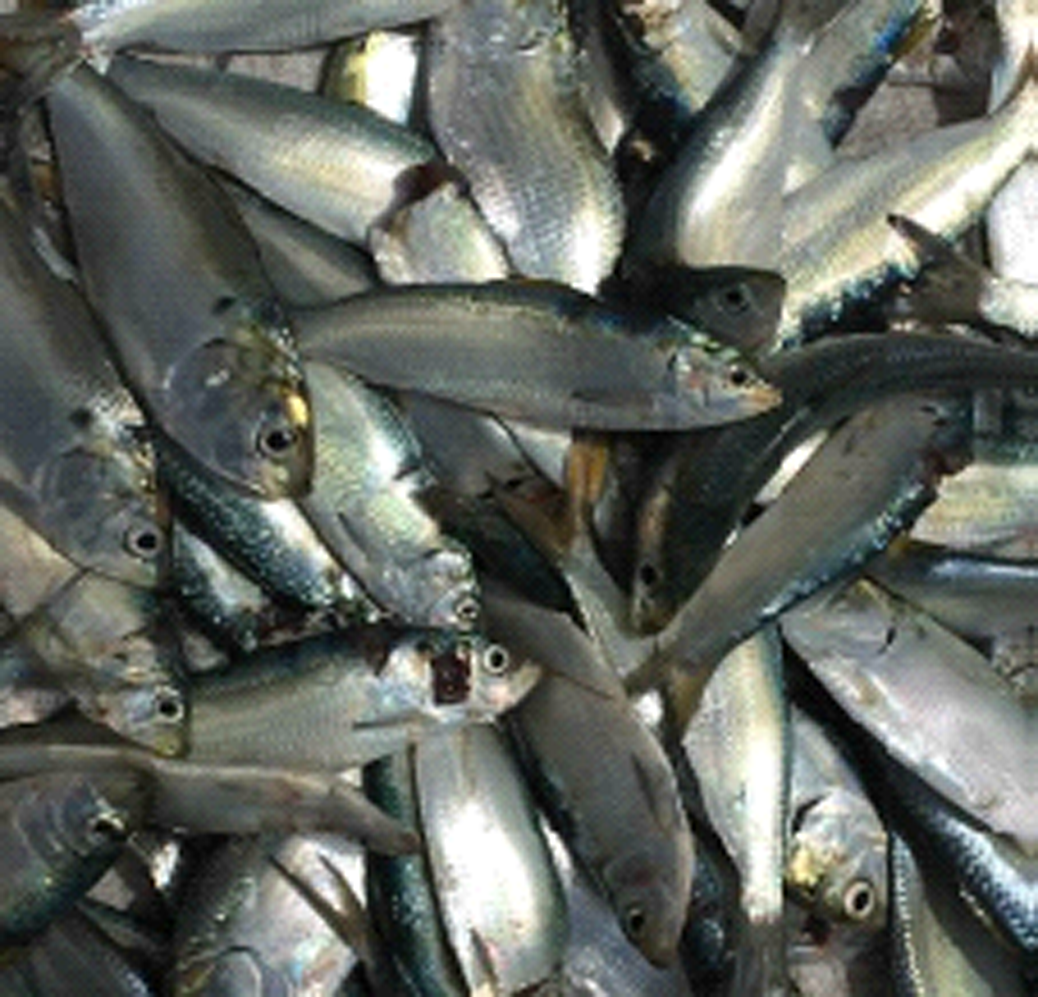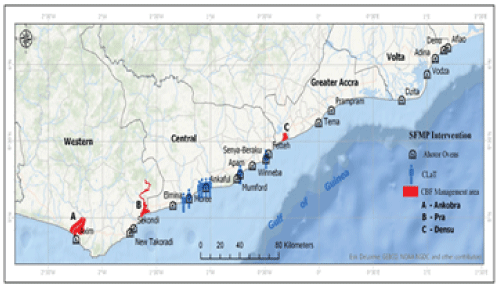Welcome - SFMP
USAID Sustainable Fisheries and Management Project (SFMP)
Summary
In Ghana, small pelagic fish (coastal swimming fish) stocks such as sardines, anchovies and mackerel are the most commercially important fish species for artisanal fishers. Not only important to fishers, these small coastal swimming fish play a critical role in local coastal economies, food security and nutrition, and coastal social stability. Fish contributes to over 60 percent of total protein intake nationally, with percentages increasing in coastal communities. This is a key protein source for pregnant mothers and developing children, and is particularly important for those most vulnerable to food insecurity.
Landings of these fish have decreased sharply in the last two decades with current landings between less than 10 to 14 percent of the maximum realized in 1997. Weak governance, input subsidies, and an open-access fishery regime with no restrictions to entry all contribute to severe overfishing and an annual increase in the number of artisanal boats chasing fewer and fewer fish. Loss of this fish stocks will have huge economic, social and human development impacts; with particularly strong negative impacts on the nutritional status of women and children.
The Feed the Future Ghana Sustainable Fisheries Management Project (SFMP), funded by the United States Agency for International Development is a five year initiative working to transform the artisanal fisheries sector and rebuild stocks. SFMP contributes to the Government of Ghana’s fisheries development objectives and U.S. Government’s Feed the Future Initiative aimed at improving food and nutritional security, economic growth and poverty eradication. SFMP is national in scope, covering the entire marine coastline of Ghana and support value chains that extend to the north of the country.
Working closely with the Ministry of Fisheries and Aquaculture Development and Ghana Fisheries Commission, SFMP is introducing structural and institutional changes focused on small pelagic fisheries management that promote participatory, ecosystem-based and adaptive management approaches that will directly support implementation of Ghana’s National Marine Fisheries Management Plan 2015-2019.
Project Activities
The project works to rebuild targeted marine fisheries stocks (small pelagics) through a number of approaches to end overfishing that include:
- Strengthened legal and institutional enabling conditions for co-management, use rights and effort reduction strategies;
- Increased science-based research and decision-making for policy and management;
- Creating constituencies that provide political and public support for rebuilding fish stocks;
- Applied management initiatives in targeted fisheries ecosystems;
- Increased gender equity and participation in fisheries management strategies;
- Public-Private Partnerships in the fisheries value chain; and
- Capacity development for targeted government and non-government institutions.
Project Duration
2014 - 2021
Implementing Partners
Coastal Resources Center of University of Rhode Island, USA (prime); Hen Mpoano; Friends of the Nation; SNV; Resonance Global; CEWEFIA; Development Action Association
Fast Facts: Fisheries in Ghana
Ghana’s fisheries sector generates over USD $1 billion in revenue each year and contributes significantly to national gross domestic product, which a decade and half ago stood at 4.5 percent.
SFMP is working with the Ministry of Fisheries and Aquaculture Development and the Fisheries Commission to rebuild fish stocks and catches through the adoption of responsible fishing practices.
SFMP is focusing on small pelagic fish along the entire coastline, as well as demersal fisheries. and essential mangrove fish habitats in the Western and Greater Accra regions.
3,286 men and women in the local fishing industry have directly benefitted from the project through training, the provision of Ahotor ovens, and other supplies.
Over 100,000 people are expected to benefit from the project; and through the rebuilding of stocks, fish catch is estimated to increase in thousands of metric tons.

Accomplishments
- Launching of a new national Fisher-to-Fisher policy dialogue creating a mechanism for fishers and government to interact around compliance and sustainable fisheries management
- Working with the Fisheries Commission to draft a new National Co-Management Policy to devolve fisheries management responsibilities to local communities and regional and district governments
- Developing a new public-private partnership that provides micro-insurance to fishers and fish processors across Ghana. This already covers over 3000 policy holders
- Expanding opportunities in the small fisheries value chain by training 750 medium, small and micro (MSMEs - mostly women owned businesses) on improved business development and value addition to products
- Strengthening long-term science-based fisheries management capacity by training at the University of Rhode Island 11 PhD students and 4 master's students (2 from Fisheries Commission and 2 from the University of Cape Coast)
- Strengthening law enforcement to combat illegal, unreported and unregulated fishing by training 60 marine police and fisheries enforcement officers on improved approaches to shore and water-based policing
- Establishing a multi-stakeholder Science and Technical Working Group (STWG) to advise the Fisheries Commission on fish stocks status and elimination of overfishing using a science based approach
- Supporting the Fisheries Commission to develop its organizational gender equity strategy
- Developing a National Anti-Child Labor and Trafficking Policy for the Fisheries Sector in collaboration with relevant agencies and ministries. As well, training 90 anti-child labor advocates in the main source area for child labor and trafficking in Ghana
- Engaging over 5400 individuals to building and strengthen constituencies supporting measures to rebuilding fish stocks at community, district, regional and national levels
- Using a blend of multimedia and mass media tools to expand awareness of threats contributing to the collapse of the artisanal fisheries sector and its related food supply
- Training more than 40 journalists to improve reporting on threats facing key fisheries stocks and related threats to national nutrition, economic development and social stability
- Strengthening the capacity of 9 local non-governmental agencies in fisheries management
- 619,498 hectares of biological significant and/or natural resources are now under improved management;
- 3,510 (90% female) micro, small and medium enterprises (MSMEs) received business development services and $56,579 of rural loans were provided to some of these MSME
- 3,250 people (71% female) received productivity or food security training , and 52,953 hours of training in natural resources management and/or biodiversity conservation was delivered.
Funding
US$23,987,000
Map of SFMP Target Areas

Key Staff Contacts
Ellis Ekekpi, (AOR) - Monitoring & Evaluation Specialist - Office of Economic Growth - eekekpi@usaid.gov
Maurice Knight - Chief of Party, Coastal Resources Center - University of Rhode Island - maurice.sfmp@crcuri.org
